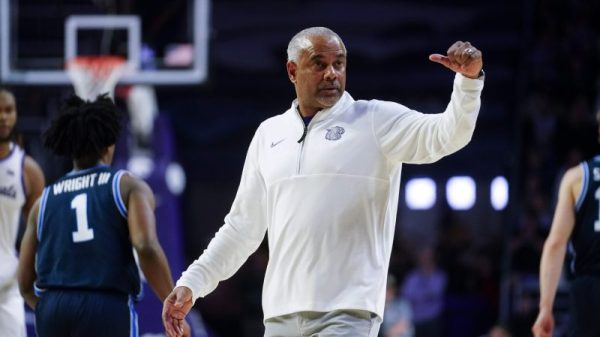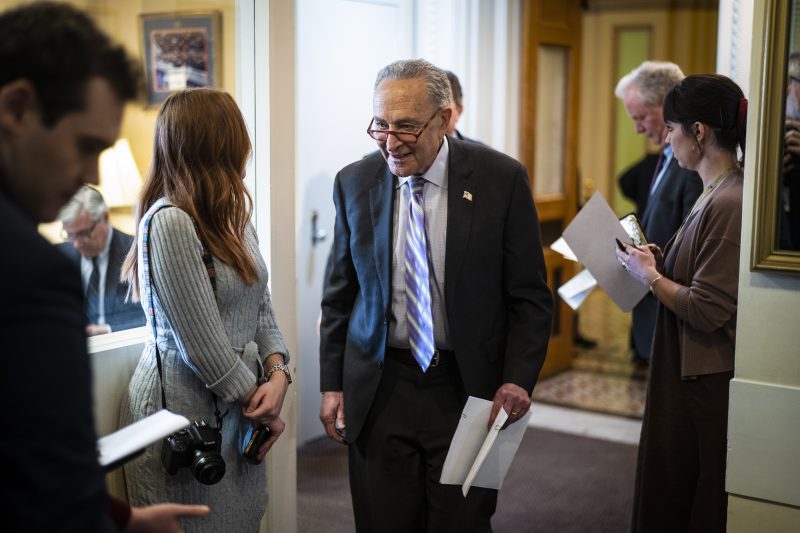Senate Majority Leader Charles E. Schumer remembers when his predecessor, Harry M. Reid, received the news that then-vice president Joe Biden had cut a legislative deal with GOP Senate Minority Leader Mitch McConnell without him.
“No one knew what Joe Biden was actually doing in the Senate,” Schumer (D-N.Y.) said about one twist in the series of fiscal negotiations between Democrats and congressional Republicans that began in 2011 and eventually culminated in a government shutdown in 2013.
But Reid’s former deputy doesn’t see a danger of the Democratic White House going around him as another fiscal showdown looms, saying he and President Biden are in lockstep on messaging and tactics so far.
“I don’t think the president will cut me out because we’re unified,” Schumer said in an interview in his office last week, adding he has a great relationship with Biden and has spoken to him about a dozen times about the debt ceiling situation already, including on a recent jaunt on Air Force One.
And the Senate majority leader brings a confidence that Republicans will eventually fold on their economic brinkmanship that comes from weathering many similar standoffs in his more than 40 years in Congress.
“Almost inevitably whoever provokes a shutdown or debt ceiling crisis loses,” Schumer said. “The side that’s not taking hostages, not playing brinkmanship always has an upper hand. The side that’s unified has an upper hand.”
“We have both — they don’t have either,” he added of the Republicans.
Lawmakers likely have until some time this summer to lift the debt ceiling to allow the nation to pay its existing obligations and avoid an unprecedented default that could have dire consequences for the global economy. Newly elected House Speaker Kevin McCarthy (R-Calif.) has said he wants to use the pending deadline as leverage to extract as-yet-undefined spending reforms, setting up a potential standoff with Biden and congressional Democrats that some fear could be even messier and damaging than the confrontations of 2011 and 2013.
Schumer brings decades of experience in Congress with past fiscal showdowns and has taken key lessons away from them that are informing his strategy as debt ceiling discussions officially kicked off last week, with Biden and McCarthy meeting at the White House. While a House member in 1995, Schumer brought a blown-up version of the New York Daily News’s “Crybaby Newt” cover with him around the Capitol, to poke fun at GOP Speaker Newt Gingrich for shutting down the government in part due to feeling personally slighted by President Bill Clinton over his seating assignment on Air Force One. (The image of Gingrich crying in diapers stuck, and the incident is credited with dashing his presidential hopes.)
“It was unclear going into this who was going to benefit and who was not going to benefit, and then when it was over it was a rout [for Democrats],” former Schumer aide Jim Kessler, now the executive vice president for policy at the Third Way think tank, said of the ’90s standoff.
Schumer later saw high-stakes fiscal negotiations from closer up, first as a top deputy to Reid through the fiscal cliff and debt ceiling negotiations of the Obama years — where he learned the dangers of getting cut out by the White House — and later as Democratic leader during the Trump administration, when he and Rep. Nancy Pelosi brokered a spending and debt ceiling deal with President Trump while both in the minority that Republicans widely decried.
“If it looks like you’re egging for one, saying, ‘I won’t do it unless I get this’ — you usually lose,” Schumer said. “And that’s from years of experience.”
Republicans disagree, and say that voters will punish Democrats if they look unwilling to seriously discuss spending reforms after Republicans took back the House in the midterms in part on a message of stemming Washington spending. (Schumer and Biden have said they believe Congress should lift the debt ceiling without attaching any other measures to it, but have not ruled out discussing budget changes separately from the debt ceiling.)
“We took the Senate in 2014 after the ’13 standoff,” said Eric Cantor, the former No. 2 House Republican during the Obama fiscal negotiations. “I’m not sure why [Democrats] think Republicans always get punished.”
The size of Schumer’s role in the debt ceiling negotiations at this point is yet to be determined. McCarthy and Biden met for more than an hour last week to kick off preliminary discussions, and House Republicans have made clear they see the meat of the negotiation happening between the president and the speaker. McConnell, for his part, has said he expects the House to take the lead.
“It’s always a good sign when Schumer’s not there,” joked Sen. John Cornyn (R-Tex.) of the initial negotiations. “He’s a troublemaker.”
“I suspect his role is muted at least for now,” said Sen. Kevin Cramer (R-N.D.) “He’s not a backbencher obviously, but he’s on the bench.”
McCarthy acknowledged to reporters that both McConnell and Schumer would need to be involved in the negotiations, given any agreement that makes it out of the Senate will need both Democratic and Republican votes.
“At the end of the day, whatever we come to an agreement on they’re going to have to be a part of, and Schumer, too,” McCarthy said of the Senate GOP.
And given McCarthy’s small majority, it’s possible the bulk of the debt ceiling negotiations could end up in the Senate, if June approaches and McCarthy has not been able to muster adequate support for a solution. Schumer has said he does not believe McCarthy has 218 Republican votes to pass anything related to the debt ceiling, given the objections some of the harder-right members of his conference have raised. Schumer has also taunted McCarthy on the floor for not being able to articulate what spending reforms he actually wants, repeatedly calling on the speaker to “show us your cards” if he is serious about negotiating.
“The Senate can be the grown-ups in the room and help lead us to a solution where we don’t default,” said Schumer, who added he gets along with McCarthy and felt “sympathy” for him as he struggled to muster enough votes to be elected speaker in January.
Yet a core piece of Schumer’s challenge will be avoiding a replay of late 2012, when Biden, tasked by Obama to come up with a deal to avert spending cuts and tax increases after the Republican House failed to do so, bypassed Reid in the Senate and made a deal directly with McConnell, the minority leader, to preserve much of the Bush tax cuts in exchange for a temporary delay of spending cuts.
To keep an upper hand this time around, Schumer must also be sure to keep his caucus together, which could prove challenging given Sen. Joe Manchin III (D-W.Va.), who faces a tough reelection battle in a red state in 2024, has already met with McCarthy to talk about a potential deal, and Schumer also has other more moderate members in his caucus up for reelection. Schumer says the caucus has “virtual unity” on the debt ceiling, and his allies say he is intentionally giving his members political wiggle room by embracing the broad “show us your plan” message aimed at McCarthy rather than ruling out talks altogether.
“The day one senator in the Democratic caucus decides, ‘Well the majority leader doesn’t really call the shots for us as a team’— that would be exactly what Kevin McCarthy needs,” said Faiz Shakir, a former Reid aide and political adviser to Sen. Bernie Sanders (I-Vt.). “He needs to break the unity of Democrats and find some way to peel off a couple of people.”
Schumer’s allies point out that the White House has followed Schumer’s lead on messaging, with Sen. Richard Blumenthal (D-Conn.) calling him “instrumental in framing it.” The White House initially said raising the debt ceiling was not up for negotiation. But after Biden invited McCarthy for a meeting, the White House shifted its message to asking McCarthy to make public his spending demands — the same call Schumer had been making on the floor of the Senate.
“I think it was a melding of the minds,” Schumer said of the messaging, which he said he and House Minority Leader Hakeem Jeffries (D-N.Y.) and Biden agreed to in a White House meeting in January. “I brought it up to [Biden], he liked it.”
Pelosi said Schumer has the benefit of a unified caucus, but at this stage the bulk of the action is between Biden and McCarthy.
“The fact is that the conversation — I don’t want to call it negotiations — is between the White House and the House Republicans,” Pelosi said.
But the former House speaker said the majority leader would be ready for it if the talks head his way.
“One thing I know about Chuck is he knows his caucus, he knows the Senate and he’ll always be ready for whatever alternatives come along,” Pelosi said.



























